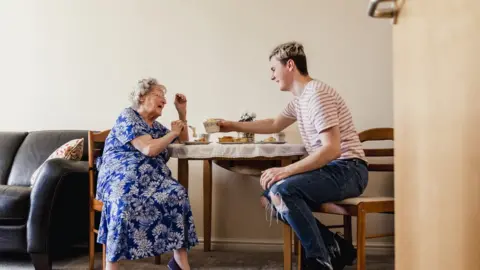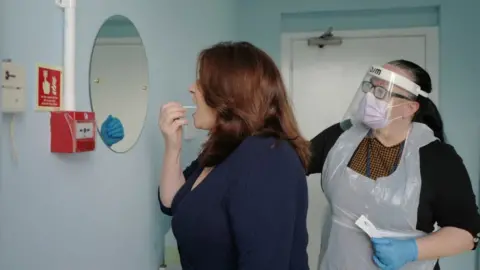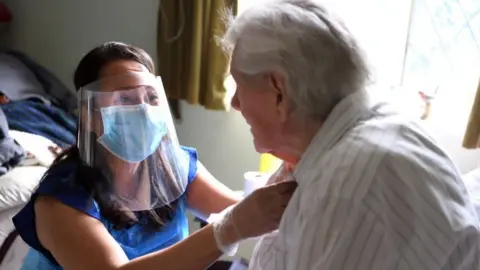Covid: What are the care home visiting rules and how are they changing?
 Getty Images
Getty ImagesRestrictions for visiting friends and family in care homes in England have been relaxed.
Rules have already eased in Scotland.
How are the rules changing in England?
As part of the lifting of the Plan B measures in England:
- there is now no limit on the number of visitors allowed at care homes
- essential care givers can keep visiting during a Covid outbreak
- residents no longer need to test or self-isolate following normal visits out
- isolation periods for those in care following an emergency hospital visit have been reduced from 14 days to a maximum of 10 days
Care home staff in England must already be vaccinated (unless exempt).
By 16 February care workers will be asked to take lateral flow tests (LFTs) before their shifts, replacing the current system which includes weekly PCR tests.
The self-isolation period for those who test positive will be reduced from 14 to 10 days, with the ability to end it even earlier, subject to testing negative on days five and six.
Care homes will only have to follow outbreak management rules for 14 rather than 28 days.
More detailed guidance will be published shortly.
 Getty Images
Getty ImagesHow are the rules changing in Scotland?
There is no longer any limit to the number of households which can visit each resident, or to the frequency or duration of visits.
Care homes can decide group numbers - including children - based on a range of factors including the size of the visiting area.
Essential and "named person" visits can continue during an outbreak of Covid.
A care home resident who has tested positive can receive one named visitor per day in their private room - as long as the visitor wears appropriate personal protection equipment (PPE) and follows physical distancing and hand hygiene rules.
- people transferring to care homes from hospitals no longer need to isolate if they have had a negative PCR test in the previous 48 hours, as long as they have no symptoms of a respiratory virus and haven't been exposed to Covid over the previous 14 days
- the isolation period for care home residents testing positive for Covid, or for close contacts of Covid cases, is cut from 14 days to 10 days
- residents who have been in hospital for acute overnight stays also no longer need to isolate on their return to the care home, and don't need a negative PCR test, as long as there is no clinical reason to think that they have Covid
 Getty Images
Getty ImagesWhat are the rules in Wales?
The Welsh government says there is "no prescribed limit" on the number of indoor visitors. Decisions about how care home visits take place rest with the provider.
They are advised to generally restrict visiting to those who are familiar with the home's procedures. Providers should risk assess requests from less frequent visitors.
- each resident may nominate one essential visitor who can continue to visit during an outbreak of Covid in the home - but cannot visit if the resident tests positive
- all visitors must take a lateral flow test (LFT) on arrival at the care home
- all visitors must wear face coverings or PPE, and follow hand hygiene rules
- they should maintain social distancing where possible, and be "careful" around close physical interactions such as hugs and kisses
- residents should test for Covid after visits out of the home but do not need to self-isolate unless they test positive
 Getty Images
Getty ImagesWhat are the rules in Northern Ireland?
Northern Ireland is in the "Gradual Easing" phase of care home visiting.
- care home residents can receive up to four visits weekly, from up to four visitors from two households each time
- children can visit and are included in the limit
- visits can take place in a resident's room with the window open, and should be booked in advance
- visitors will be screened for Covid
- close physical contact is allowed, including "brief" hugging
- hand hygiene practices and masks to remain
- residents may leave the home, subject to the restrictions in place for the general public, but must test and isolate on their return
Hospice residents may have one daily visit, from two nominated individuals, either separately or together.
The rules are due to be reviewed again by the end of February.